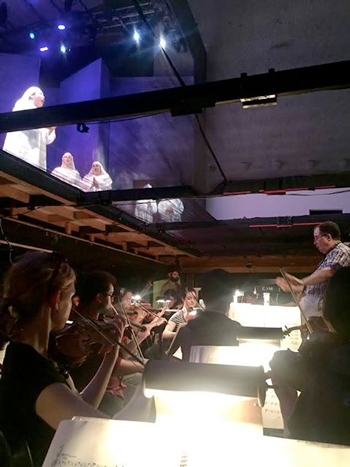by Daniel Hathaway

Though lightened by a sea of white-habited, giggling nuns, Puccini’s one-act — the middle opera of Il trittico — checks most of the essential plot boxes of verismo opera. Angelica (thrillingly sung on Friday by Nayoung Yeo) has disgraced her family by giving birth to an illegitimate child and is packed off to a nunnery. Visited by her aunt The Princess (portentously sung by Meg Linebaugh), she learns that the child has died and that her sister, soon to be married, wants her to renounce her claim to the family inheritance.
After seeing a vision of her child calling to her from paradise, Angelica takes poison, then realizes that she is committing a mortal sin. The Virgin appears to her, bringing absolution, and mother and child are reunited in heaven.
All-female except for the Child (Matthew Chang), the large cast was vocally strong on Friday evening, its many small roles expertly sung. Compelling as she was in the role of the Princess, Linebaugh was got up like a caricature of a wicked aunt — as if Lady Bracknell had wandered in from another show.
Befitting a cloister of nuns, there’s a lot of chorus work in this piece, and chorus master John Simmons melded both the onstage and offstage groups (men and children) into sonorous ensembles. Director David Bamberger likes to create crowd scenes that are pleasing to the eye, and his Sisters were a well-regimented company who always looked good. Sets and lighting by Dave Brooks and costumes by Inda Blatch-Geib nicely complemented the action.
Harry Davidson, conducting the CIM Orchestra from the pit, led a well-blended performance of Puccini’s score, though the pacing of the show might have been more continuous: some significant pauses between sections of the music left the cast looking frozen in place.
The libretto, Menotti’s own creation, finds the air-headed Amelia (Caroline Bergan) putting her chambermaids and Husband (Xiaoyang Zhang) through the hysteria of getting her ready for the first ball of the season. Complication: the Husband finds a letter exposing Amelia’s affair with the upstairs neighbor (Benjamin Liu), who rappels down from the balcony and hides under a table. Husband finds him, produces a pistol, and a strange roundtable conversation about the meaning of life ensues.
To make a short story shorter, Amelia cracks her husband over the head with a vase, and pretends to have been burgled by the upstairs neighbor. Neighbors and the police arrive. Husband is taken off in an ambulance, the upstairs neighbor is arrested, and Amelia goes off to the ball arm in arm with the police chief.
Menotti’s opera buffa begins with an extensive overture, bright, cheerful, and beautifully played by Davidson and the Orchestra. The lengthy introductory music seemed to need some stage business to accompany it — perhaps the perfect opportunity to introduce busy chambermaids hunting up Amelia’s accessories.
Bergan was the very picture of a preening, self-involved socialite, and her bright, appealing soprano perfectly suited Menotti’s virtuosic vocal lines. Zhang played the Husband with deadpan seriousness, and Benjamin Liu was appropriately comic as Amelia’s lover. Bryant Bush created an engagingly mock-heroic Chief of Police.
Once again, Bamberger’s stage pictures were beautifully composed — though neighbors crowding around a crime scene probably don’t form such straight lines.
Amelia al ballo enjoyed the same function on this double-bill as Gianni Schicchi does at the end of Il trittico — providing catharsis for the audience after running them through something of an emotional wringer. A fluffy farce was the perfect ending to the evening.
Published on ClevelandClassical.com November 22, 2016.
Click here for a printable copy of this article



